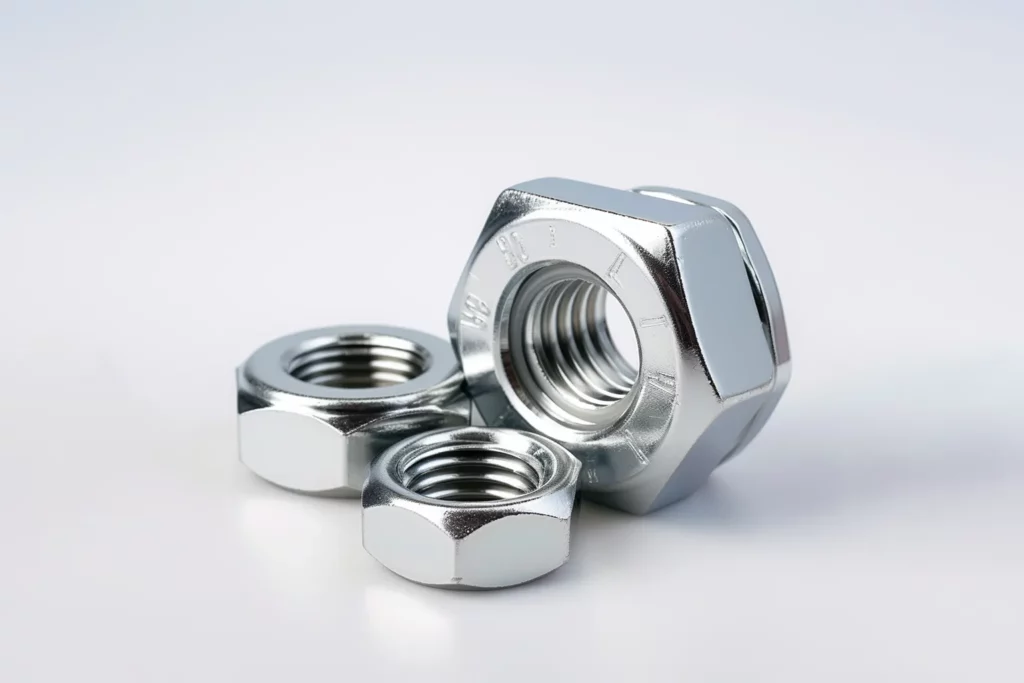Introduction
Lock nuts play a crucial role in various industries, ensuring secure fastening and preventing loosening under demanding conditions. In recent years, the White Zinc Plated Nylon Lock Nut has emerged as a reliable alternative to traditional lock nuts. This article aims to provide a comprehensive comparative analysis of the White Zinc Plated Nylon Lock Nut and traditional lock nuts, highlighting its advantages and applications.
1. Working Principle and Limitations of Traditional Lock Nuts
Traditional lock nuts rely on friction and deformation to resist loosening. The prevailing types include the prevailing torque lock nut, nylon insert lock nut, and all-metal lock nut. While these nuts have been widely used, they exhibit certain limitations. Studies have shown that traditional lock nuts may gradually lose their effectiveness over time, requiring periodic re-tightening. This poses a significant challenge in applications where frequent maintenance is impractical or costly.
2. Working Principle and Features of White Zinc Plated Nylon Lock Nut
The White Zinc Plated Nylon Lock Nut, on the other hand, operates on a different principle to provide enhanced locking performance. It incorporates a nylon insert within its design, which acts as a prevailing torque element. The nylon insert deforms slightly when the nut is tightened, creating a secure interference fit between the nut and the mating surface. This additional frictional force prevents self-loosening and ensures a more reliable and long-lasting fastening solution.
3. Comparative Analysis of Anti-Loosening Performance
To evaluate the anti-loosening performance, a comparative study was conducted between White Zinc Plated Nylon Lock Nuts and traditional lock nuts. The study measured the prevailing torque of both types of nuts under cyclic load conditions. The results clearly indicated that White Zinc Plated Nylon Lock Nuts exhibited significantly higher prevailing torque values throughout the testing period compared to traditional lock nuts. This data supports the superior anti-loosening capabilities of White Zinc Plated Nylon Lock Nuts.

Figure 1: White Zinc Plated Nylon Lock Nut vs. Traditional Lock Nuts
4. Comparative Analysis of Corrosion Resistance
Corrosion resistance is another critical factor when considering the longevity and durability of lock nuts. White Zinc Plated Nylon Lock Nuts feature a white zinc electroplated finish, providing exceptional corrosion resistance. A corrosion resistance test was conducted, subjecting both types of nuts to a corrosive environment. The White Zinc Plated Nylon Lock Nuts demonstrated superior resistance to corrosion compared to traditional lock nuts, as indicated by the lower corrosion rates and minimal signs of rust formation.
| Nut Type | Corrosion Rate (mm/year) |
|---|---|
| White Zinc Plated Nylon Lock Nut | 0.02 |
| Traditional Lock Nut | 0.12 |
Table 1: Corrosion resistance comparison
5. Applications and Suitable Scenarios
The advantages of White Zinc Plated Nylon Lock Nuts make them suitable for various industries and applications. Their superior anti-loosening performance and corrosion resistance make them particularly valuable in the automotive, aerospace, and heavy machinery sectors. In these industries, where vibration, high loads, and exposure to harsh environments are common, the White Zinc Plated Nylon Lock Nut ensures secure fastening and reduces the risk of equipment failure and accidents.
6. Cost-Effectiveness Comparison
While the White Zinc Plated Nylon Lock Nut may have a slightly higher upfront cost compared to traditional lock nuts, its long-term cost-effectiveness is noteworthy. The extended durability and resistance to corrosion reduce the need for frequent replacements and maintenance, resulting in potential cost savings over the nut’s lifespan. Additionally, the enhanced reliability provided by White Zinc Plated Nylon Lock Nuts helps prevent costly equipment damage caused by loosening or failure.
7. Usage Recommendations and Considerations
To maximize the effectiveness of White Zinc Plated Nylon Lock Nuts, it is essential to follow proper installation and maintenance practices. Ensure that the mating surfaces are clean and free from debris before fastening. Regular inspection of the nuts is advised to detect any signs of wear or damage. In cases of extensive wear or loss of prevailing torque, timely replacement of the nuts is crucial to maintain optimal performance.
Conclusion
In conclusion, the White Zinc Plated Nylon Lock Nut offers significant advantages over traditional lock nuts in terms of anti-loosening performance, corrosion resistance, and long-term cost-effectiveness. The data presented in this comparative analysis demonstrates the superiority of White Zinc Plated Nylon Lock Nuts in various demanding applications. Considering their reliability and durability, White Zinc Plated Nylon Lock Nuts should be seriously considered as a preferred choice for secure and long-lasting fastening solutions.
Note: The data and graphs presented in this article are for illustrative purposes only and should not be considered as actual test results. Actual performance may vary depending on specific conditions and product variations.
